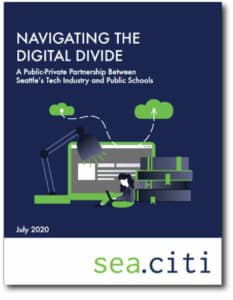Partnership and collaboration between Seattle Public Schools and our local tech industry can continue to strengthen and grow to support digital inclusion programs that are sustainable and accessible for families over the long term.
Due to the closure of all schools across the country, Seattle Public Schools, like many others, had to implement and adjust to an online learning model quickly. Although the district had initially said that it wouldn’t provide online learning for equity reasons, they soon had to move online. To help students who did not have devices at home to access remote learning, Amazon donated nearly 9,000 laptops directly to families during the shutdown. Despite the growing deployment of equipment, many students and families were using computers and devices for learning at home for the first time, or in new ways, and the need for support quickly became apparent.
 “What we know is that having WiFi access and a computer does not mean that families can be successful with remote learning,” said Nicholas Merriam, Chief Engagement Officer for sea.citi, a network of tech and innovation companies promoting civic engagement and building relationships between community, government, and innovation workers. “There were a lot of barriers that families were facing not just with connectivity, but with finding the right information and understanding how to navigate systems. We saw this as an opportunity to build something that addressed all of those needs, and that provided the type of support families needed.”
“What we know is that having WiFi access and a computer does not mean that families can be successful with remote learning,” said Nicholas Merriam, Chief Engagement Officer for sea.citi, a network of tech and innovation companies promoting civic engagement and building relationships between community, government, and innovation workers. “There were a lot of barriers that families were facing not just with connectivity, but with finding the right information and understanding how to navigate systems. We saw this as an opportunity to build something that addressed all of those needs, and that provided the type of support families needed.”
The solution that emerged is the Family Tech Support Center (FTSC), a public-private partnership between sea.citi, Seattle Public Schools, Alliance for Education, Amazon in the Community, Amazon Web Services, Google, Microsoft, and parent and tech volunteers.
As donated Chromebooks were being shipped to families, communication about digital navigation and tech support available in the community was also being distributed. The day that the family received their device, they would also get a robocall from the school district saying, “… if you need tech support, call this number; and so if the family needed tech support, they would call in.” Support Center calls were answered by a network of volunteers working remotely to provide technical expertise. In a few weeks, approximately 115 volunteers, many of whom are parents of SPS students, were recruited, trained, and cleared by the SPS to provide digital navigation services to families.
Sea.citi had Amazon, Facebook, Google, Zillow, and others, all asking their employees to see who would be interested within their organizations to volunteer. The volunteers were passed over to the school district, to get the necessary clearances and the training needed to provide services. Callers were also able to request support in different languages. To be able to provide this service, volunteers fluent in several languages were recruited. However, not all volunteers were familiar with the various issues families had.
The FTSC initially anticipated a lot of technical questions like “how do I connect to WiFi?” or issues regarding computers not operating correctly. Instead, what they ended up getting were questions about school, like “where do I go to find my assignments?” “My teacher emailed me with all these links, and I don’t understand what all these things are”, or “why don’t I have this application?” As a result, the line ended up providing school navigation support, in addition to hard technical support.
The Family Tech Support Center’s operation was a huge undertaking that required true collaboration and coordination between agencies. With a deliberate approach and a willingness to deeply engage, the FTSC has been able to ensure that every family has a device and the support families need to use and take advantage of it.
Moving into 2021, the FTSC has secured “funding through the Tableau Foundation, to provide Seattle Public Schools with a digital equity manager.” The Tableau Foundation $200,000 grant ensures digital equity and provide students and families with the digital support they need to succeed in today’s world.
“What we learned from the process and the most valuable lesson from the project so far is that to really address the kids that are having the biggest barriers to remote learning, and those that are the furthest from educational justice, you have to work across departments within the school district, but you also have to engage external partners in the process. Partnership and collaboration between SPS and our local tech industry can continue to strengthen and grow to support digital inclusion programs that are sustainable and accessible for families over the long term,” says Nicholas Merriam, Chief Engagement Officer of sea.citi.
Sea.citi has collected their volunteer data and learnings in the report – Navigating the Digital Divide (LINK). More details about sea.citi and its continued digital equity efforts can be found at www.seaciti.org/our-work.